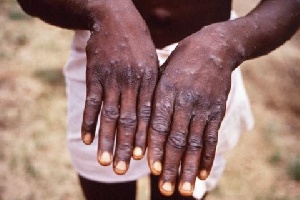- Home - News
- TWI News | TV
- Polls
- Cartoons
- Year In Review
- News Archive
- Crime & Punishment
- Politics
- Regional
- Editorial
- Health
- Ghanaians Abroad
- Tabloid
- Africa
- Religion
- Election 2020
- Coronavirus
- News Videos | TV
- Photo Archives
- News Headlines
- Press Release
- News Blogs
Health News of Thursday, 15 August 2024
Source: www.ghanaweb.com
Understanding Mpox: What you need to know about the new global health emergency declared by WHO
The World Health Organization (WHO) on Wednesday, August 15, 2024, declared the ongoing mpox outbreak in Africa a global health emergency following the rapid spread of the disease in the Democratic Republic of Congo(DRC) and other countries in Africa.
The WHO Director-General, Dr. Tedros Adhanom Ghebreyesus, explained that the upsurge of mpox in the Democratic Republic of the Congo (DRC) and a growing number of countries in Africa constitutes a public health emergency of international concern (PHEIC) under the International Health Regulations (2005) (IHR).
In declaring the PHEIC, Dr. Tedros said, "The emergence of a new clade of mpox, its rapid spread in the eastern DRC, and the reporting of cases in several neighbouring countries are very worrying. On top of outbreaks of other mpox clades in the DRC and other countries in Africa, it’s clear that a coordinated international response is needed to stop these outbreaks and save lives."
The WHO Regional Director for Africa, Dr. Matshidiso Moeti, said, “Significant efforts are already underway in close collaboration with communities and governments, with our country teams working on the frontlines to help reinforce measures to curb mpox. With the growing spread of the virus, we’re scaling up further through coordinated international action to help countries bring the outbreaks to an end.”
Since the beginning of the year, more than 17,000 mpox cases and more than 500 deaths have been reported in 13 countries in Africa. The Africa Centres for Disease Control and Prevention has also classified the outbreak as a “very high risk event.”
What is mpox?
WHO describes the mpox disease, formerly known as monkeypox, as a zoonosis disease that is transmitted from animals to humans, with cases often found close to tropical rainforests where there are animals that carry the virus.
The disease can be transmitted through contact with bodily fluids, lesions on the skin or internal mucosal surfaces, such as in the mouth or throat, respiratory droplets and contaminated objects
Symptoms
The disease typically appears within five to 16 days after exposure but can develop up to 21 days.
It generally includes fever, headache, muscle aches and backaches, swollen lymph nodes, chills, exhaustion, and a distinctive rash characterised by lesions that progress through several stages before falling off.
Most people fully recover from the disease within four weeks but that is dependent on how mild or severe symptoms are present in a patient.
Ghana Health Service heightens surveillance in Ghana
The Director for Public Health, Dr. Franklin Asiedu-Bekoe, has revealed that the Ghana Health Service has reactivated its surveillance on the disease.
He told ghanaiantimes.com.gh that oriented health professionals are on the lookout for early detection of cases.
Dr. Asiedu-Bekoe said although the country recorded some cases of mpox in the last two years, no case has been recorded so far.
“We have heightened surveillance, and the clinicians are also being re-trained. Early detection is what we are working on, and thankfully, we have a reference laboratory that has also improved our case confirmation from relying on Noguchi alone previously," he noted.
A clinical epidemiologist and public health physician, Professor Fred Binka, also speaking to ghanaiantimes.com.gh, stressed the need for countries to be on high alert for the disease.
“The rate of spread shows that the ‘Clade 1b’ strain is highly infectious so for countries like Ghana, all 16 regions must be ready and looking out for both positive and negative results.
“In this case, negative results are also important and people must report. Once we suspect that there are cases, we must make sure that we are supplying the facilities with reagents so that they will be able to do the initial diagnosis and then send it to our reference laboratories for confirmation,” he advised.
He urged the public to quickly seek medical intervention when they experience malaria-like symptoms.
“When you have a fever, feel nauseous, or have muscle pain, do a test. If it doesn’t confirm malaria, remember that it can be some other disease, like in this case, mpox, and then seek further tests to be done," he advised.
JKB/ ADG
Watch the latest episode of Everyday People below:
#CelebratingUncleEboWhyte: Documentary set for release
— GhanaWeb (@TheGhanaWeb) August 15, 2024
Supreme Court judge, Justice Kulendi reveals one secret about Uncle Ebo Whyte #ExcellenceInTheatre#CelebratingEboWhyte#EboWhyteAt70 pic.twitter.com/MnRmGkayiu











